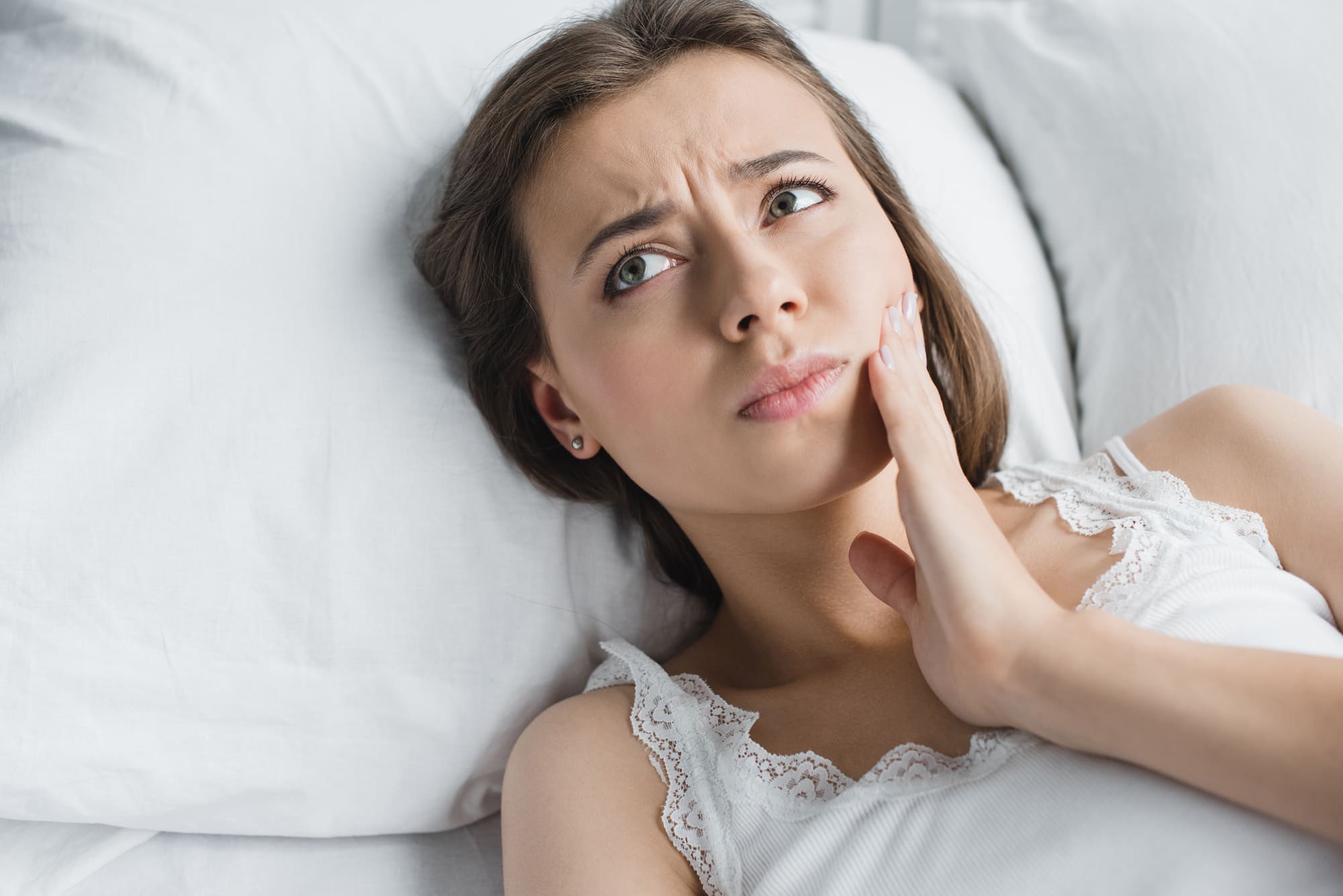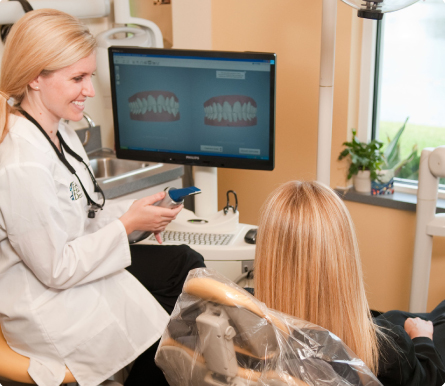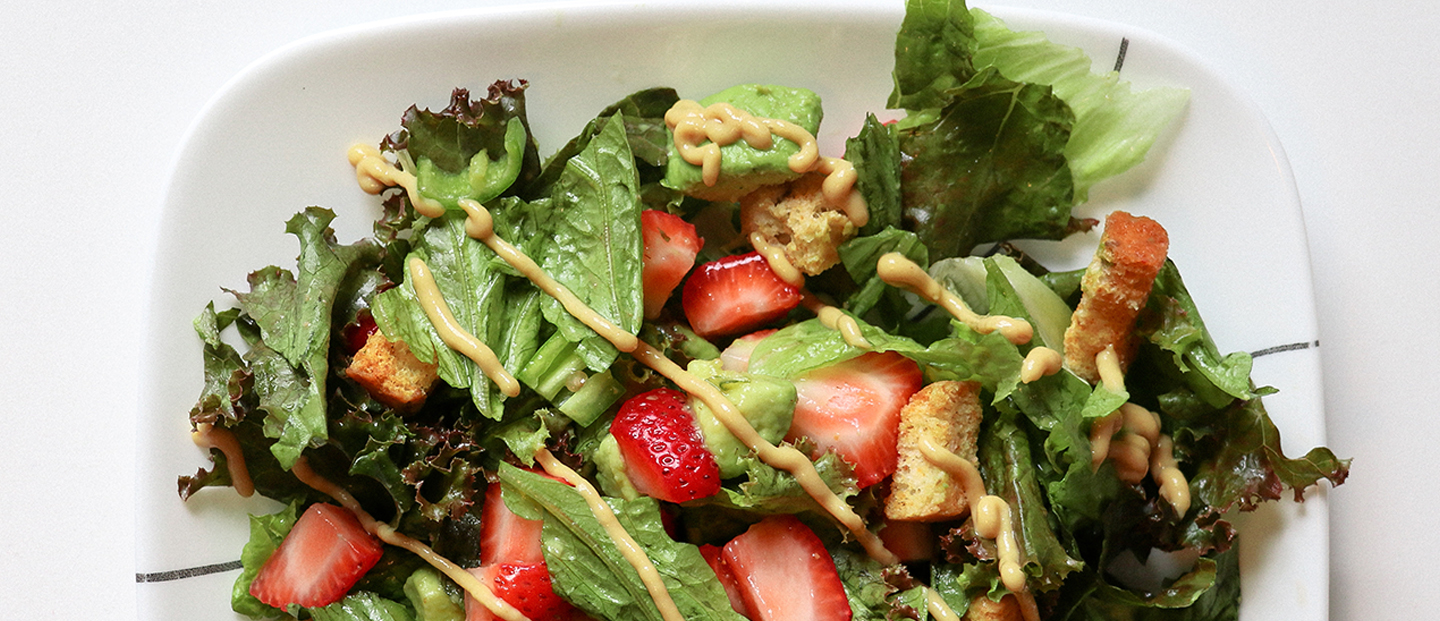How Can I Stop Grinding My Teeth?
Apr 3, 2023

Teeth grinding, also called bruxism, occurs when someone clenches or grinds their teeth excessively. Its exact cause is unknown, but it’s most commonly linked to things like stress, sleep apnea, trauma, breathing issues, and more. It can cause permanent damage to the teeth and jaw if not corrected, so it’s important to stop it as soon as possible.
Ways to Prevent Grinding Teeth
Most teeth grinding happens at night, but it can also happen during the day. There are a wide variety of ways to prevent teeth grinding so you can find the method that works best for you and the cause of your teeth grinding.

Visit the Dentist
If you discover that you’re grinding your teeth, the first step should be to consult with your dentist. They can help determine if the cause of your teeth grinding is a breathing airway issue, trauma to your teeth, teeth alignment, or another issue and recommend treatment.
Wear a Mouth Guard at Night
A mouth guard, or night guard, can help protect your teeth at night. It won’t stop the grinding, but it will prevent the wear and tear on your teeth while you determine the underlying cause of the teeth grinding and work to address it. You can get a mouth guard fitted at your dentist’s office.
Relax and De-stress
Teeth grinding can be caused by stress and anxiety, so one method of preventing it is to find a way to relax and de-stress.
Mindfulness and Meditation
Mindfulness is the practice of being aware of your thoughts and sensations. It is paying attention to every detail of what you’re currently doing or thinking about. Meditation involves focusing your attention on just one thing, usually breathing. The idea is to bring your focus back to that one thing each time you find your mind wandering. There are many tutorials online for every level, including beginners. If you’re not comfortable meditating on your own, there are also guided meditations available.
Both techniques are ways to relax the mind and reduce stress. In addition, through mindfulness, you may be more aware of when you are clenching your jaw or grinding your teeth during the day. It’s best to practice mindfulness throughout the day and meditation in the morning to start the day relaxed. Meditate again just before bed to ensure you’re relaxed at night.
Get a Massage
Getting a full-body massage is a good way to relax in general. For teeth grinding, there is a specific spot you can massage as well that may help relax your jaw. The masseter muscle is located where the jaw connects to the rest of the skull. Massaging at that notch, which is about an inch in front of the ears, can help relax the muscles in your face. Massaging the muscles in your neck can also help.
Take a Bath
Taking a bath just before bed can help ensure that you’re relaxed when you go to sleep. Relaxed muscles can help reduce the chances of teeth grinding.
Exercise
Exercise produces endorphins, which reduce stress and anxiety. There are also specific exercises for your jaw and neck that can relax those muscles specifically to help prevent teeth grinding.
Talk to a Therapist
Speaking with a therapist, also called cognitive behavioral therapy, or CBT, can help ease stress and anxiety. A therapist can help you discover the cause of the stress and anxiety and find ways to relieve it.
Hold a Warm Cloth Against Your Cheeks
Holding a warm cloth against your cheeks where the jaw connects to the rest of your skull can help relax the muscles there. Do this just before bed to ensure that your jaw muscles are relaxed when you go to sleep, decreasing the likelihood of teeth grinding during the night.
Watch What Goes Into Your Mouth
What you put into your body can be just as important in the prevention of teeth grinding as it is to your overall health.
Don’t Smoke or Use Tobacco
Smoking and tobacco use, even vaping, can contribute to teeth grinding. Quitting smoking or vaping altogether can help prevent teeth grinding as well as other oral health problems such as toothache and gingivitis. Nicotine is associated with bruxism, so while nicotine patches can help you quit, taking nicotine out of your life altogether is the best way to prevent teeth grinding.
Avoid Alcohol and Caffeine
Alcohol is bad for your teeth to begin with because it wears down the enamel, but it also contributes to teeth grinding because it can affect the normal sleep functions of the brain. Caffeine also increases alertness and prevents relaxation. Avoiding both will help you relax and sleep more naturally, reducing the risk of teeth grinding.
Skip Chewy Foods
Avoid foods that are too chewy. This won’t necessarily prevent teeth grinding, but it can give your jaw a rest and help reduce soreness.
Don’t Chew Anything But Food
Don’t chew pencils or paper clips or any non-food item. If you can retrain yourself to chew only food, then that can help stop your teeth grinding. Chewing on hard objects trains your jaw to clench and increases the likelihood of that happening during the night or if you’re not actively preventing it.
Pay Attention to Your Mouth
Throughout the day, pay attention to your mouth and jaw. Any time you feel your jaw clenching, focus on relaxing your mouth. After a while, you may be able to train your jaw to stop clenching and it may become automatic.
Eat a Nutritious Diet
Eating a nutritious and balanced diet can reduce the risk of teeth grinding by ensuring that you’re not deficient in any vitamins. Calcium, potassium, Vitamin C, Vitamin B-5, and magnesium can all help reduce teeth grinding. They’re available over-the-counter in supplement form if your diet is deficient in any of them.
Take a Multivitamin Supplement
A general multivitamin supplement can help ensure that you’re getting the right nutrients to prevent teeth grinding. Especially if you don’t know which, if any, vitamins or minerals you may be deficient in, a multivitamin is a good way to cover everything and improve your nutrition overall.
Take Medicine
There is no medicinal cure for teeth grinding, but there are medicines that can help address the symptoms caused by bruxism.
Take Ibuprofen
Ibuprofen can help ease any pain or aches you have as a result of teeth grinding. It can also reduce inflammation in the jaw caused by bruxism.
Take a Muscle Relaxant
A muscle relaxant can help relax your jaw muscles prior to going to bed. Having relaxed muscles can help prevent teeth grinding.
What Causes Teeth Grinding?
There are many possible causes of teeth grinding. While wearing a night guard or taking a pain reliever can address the symptoms of teeth grinding, they won’t actually stop it from happening. To prevent teeth grinding altogether, it’s necessary to discover the underlying cause behind it.
Stress, Anxiety, and Depression
Stress and anxiety can affect your health in many ways, including by causing teeth grinding. The tension from these can cause teeth grinding at night while you’re sleeping. Some people who are depressed turn to alcohol, which in turn exacerbates bruxism. Any repressed emotions, anxieties, and fears can be expressed at night in the form of teeth grinding.
Medicines
The side-effects of some medicines can cause teeth grinding. If you are on prescribed medications, talk to your doctor about the side effects or the possibility of switching medications.
Allergies
Allergies, even seasonal allergies, can affect your breathing. Nasal congestion is a contributing factor to teeth grinding. It can also affect your sleep. Treating allergies with an antihistamine, or by speaking to your doctor for other treatment options, can help reduce bruxism.
Eating Disorders
Eating disorders such as anorexia and bulimia have been linked to sleep disorders and teeth grinding. Addressing the eating disorder can help relieve the teeth grinding as well.
Sleep Disorders
Sleep disorders such as sleep apnea can cause bruxism. This is because in people with sleep disorders, often a relaxed jaw and tongue end up blocking their airway, hindering their breathing. The natural response is for the body to tense the jaw and grind the teeth to aid in breathing. Treating the sleep disorder can help prevent teeth grinding.
Abnormal Bite or Missing Teeth
If you have an abnormal bite or crooked or missing teeth, that may cause bruxism. Talk to your dentist about correcting your teeth via orthodonture to prevent teeth grinding.
How Do I Know If I Grind My Teeth?
There are many symptoms that you can look out for that can point to teeth grinding. Teeth grinding is usually the symptom of another condition. If you know you have another condition such as sleep apnea, anxiety, or allergies, that has teeth grinding as a possible side-effect, you can pay more attention to the symptoms of bruxism.
Different people experience different symptoms of teeth grinding.
Facial Pain and Headaches
Teeth grinding causes tension in the facial muscles and so can cause pain across the face as well as headaches.
Earache
The hinge of your jaw is very close to the ears. Teeth grinding causes tension and pain in the jaw, which can spread to the ears.
Stiff Jaw
Normally, the body treats sleep as an opportunity to rest the muscles in the jaw, to give your mouth a break from talking and eating. Teeth grinding, however, not only prevents that rest but it also actively uses your jaw muscles during the night so that your jaw is even more tired and stiff.
Disrupted Sleep
Teeth grinding is often caused by or is a symptom of sleep disorders. Your own sleep may not be disrupted by the teeth grinding itself, but it can be affected by the underlying cause of it. Your teeth grinding can also affect your partner’s sleep, since it can be loud and keep him or her awake.
Worn-Down Teeth
Long-term teeth grinding will eventually wear down your teeth and their protective enamel coating. This makes the teeth more sensitive to heat and cold as well as to pain. The most sensitive part of the tooth, the dentin, can be exposed. This could eventually lead to the loss of teeth if it’s not addressed and treated.
Ask Your Partner to Look Out For It
If you suspect that you may be grinding your teeth at night, ask your partner to look out for it. He or she can listen for signs of you grinding your teeth in your sleep that you wouldn’t be able to catch yourself.
What Long-Term Problems Can Teeth Grinding Cause?
Occasionally grinding one’s teeth is perfectly normal and won’t have any lasting side-effects. However, long-term bruxism can eventually have permanent effects if it’s not treated and prevented.
Tooth Damage
The teeth are the primary recipient of any damage from teeth grinding. The grinding puts constant pressure on the teeth.
Loss of Enamel
Teeth grinding wears down the teeth and will eventually wear through the enamel. The enamel is what protects the teeth and its loss can cause further damage.
Stress Fractures
The constant wear from teeth grinding can cause the teeth to fracture and crack over time.
Tooth Decay and Erosion
The loss of enamel caused by teeth grinding leaves the teeth unprotected. This can, in turn, lead to tooth decay and the wearing down of the teeth.
Jaw Damage
Teeth grinding causes constant pressure on the jaw, which can lead to jaw pain and eventually the misalignment of the jaw.
Digestive Problems
Finally, with jaw and teeth damage caused by bruxism, sufferers may eventually have digestive problems from not being able to properly chew their food. Partially chewed food creates an excess of stomach acid, which then causes indigestion, acid reflux, and heartburn.
For informational purposes only.














